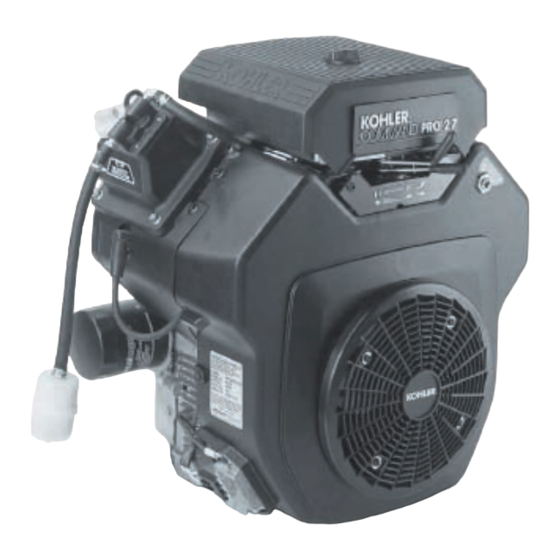Kohler Command PRO CH26 Instrukcja obsługi - Strona 13
Przeglądaj online lub pobierz pdf Instrukcja obsługi dla Silnik Kohler Command PRO CH26. Kohler Command PRO CH26 21 stron. Command series
Również dla Kohler Command PRO CH26: Instrukcja obsługi (21 strony), Instrukcja obsługi (21 strony), Instrukcja obsługi (8 strony), Instrukcja obsługi (21 strony), Instrukcja obsługi (14 strony)

Clean Air Intake/Cooling Areas
To ensure proper cooling, make sure the grass screen,
cooling fins, and other external surfaces of the engine
are kept clean at all times.
Every 100 hours of operation (more often under
extremely dusty, dirty conditions), remove the blower
housing* and other cooling shrouds. Clean the cooling
fins and external surfaces as necessary. Make sure the
cooling shrouds are reinstalled.
NOTE: Operating the engine with a blocked grass
screen, dirty or plugged cooling fins, and/or
cooling shrouds removed, will cause engine
damage due to overheating.
*Cleanout kits 25 755 20-S (black) or 25 755 21-S
(gold) allow inspection and cleanout of the cooling
fins, without removing the blower housing.
Ignition System
Carbureted Engines - Use an electronic Capacitive
Discharge (CD) ignition system. Other than
periodically checking/replacing the spark plugs, no
maintenance, timing, or adjustments are necessary or
possible with this system.
EFI Engines - Incorporate a computer-controlled
battery ignition system with individual coils. Other
than periodically checking/replacing the spark plugs,
no maintenance, timing, or adjustments are necessary
or possible with this system.
Check Spark Plugs
Every 200 hours of operation, remove the spark plugs,
check condition, and reset the gap or replace with new
plugs as necessary. The standard spark plug is a
®
Champion
RC12YC (Kohler Part No. 12 132 02-S). RFI
complaint engines use a Champion
Part No. 25 132 14-S) spark plug. A high-performance
spark plug, Champion
®
Platinum 3071 (used on Pro
Series engines, Kohler Part No. 25 132 12-S) is also
available. Equivalent alternate brand plugs can also
be used.
1. Before removing the spark plug, clean the area
around the base of the plug to keep dirt and
debris out of the engine.
2. Remove the plug and check its condition. Replace
the plug if worn or reuse is questionable.
NOTE: Do not clean the spark plug in a machine
using abrasive grit. Some grit could
remain in the spark plug and enter the
engine causing extensive wear and
damage.
Figure 14. Servicing Spark Plug.
Battery Charging
Batteries produce explosive hydrogen gas while being charged.
To prevent a fire or explosion, charge batteries only in well
ventilated areas. Keep sparks, open flames, and other sources of
ignition away from the battery at all times. Keep batteries out of
the reach of children. Remove all jewelry when servicing
batteries.
Before disconnecting the negative (-) ground cable, make sure
all switches are OFF. If ON, a spark will occur at the ground
cable terminal which could cause an explosion if hydrogen gas
or gasoline vapors are present.
®
XC12YC (Kohler
NOTE: Do not apply 12 volt DC to kill terminal of
Fuel System
The EFI fuel system operates under high pressure, and the fuel
filter and fuel line used must be approved system components
only. Use of substitute parts can result in system failure,
gasoline leakage and possible explosion.
Fuel Filter
Carbureted Engines: Most engines are equipped with
an in-line fuel filter. Periodically inspect the filter and
replace with a genuine Kohler filter every 200
operating hours.
3. Check the gap using a wire feeler gauge. Adjust
the gap to 0.76 mm (0.030 in.) by carefully
bending the ground electrode. See Figure 14.
Wire Gauge
Spark Plug
Ground
Electrode
4. Reinstall the spark plug into the cylinder head.
Torque the spark plug to 24.4-29.8 N·m
(18-22 ft. lb.).
WARNING: Explosive Gas!
ignition module.
WARNING: Fuel System Under Pressure!
0.76 mm
(0.030 in.) Gap
13
